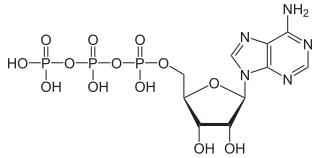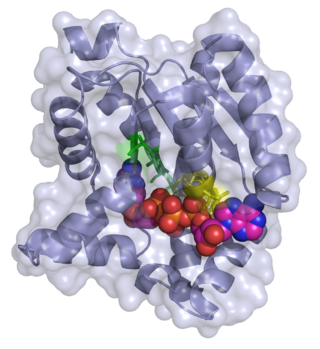
Adenosine triphosphate (ATP) is an organic compound that provides energy to drive and support many processes in living cells, such as muscle contraction, nerve impulse propagation, condensate dissolution, and chemical synthesis. Found in all known forms of life, ATP is often referred to as the "molecular unit of currency" of intracellular energy transfer. When consumed in metabolic processes, it converts either to adenosine diphosphate (ADP) or to adenosine monophosphate (AMP). Other processes regenerate ATP. The human body recycles its own body weight equivalent in ATP each day. It is also a precursor to DNA and RNA, and is used as a coenzyme.

Adenosine diphosphate (ADP), also known as adenosine pyrophosphate (APP), is an important organic compound in metabolism and is essential to the flow of energy in living cells. ADP consists of three important structural components: a sugar backbone attached to adenine and two phosphate groups bonded to the 5 carbon atom of ribose. The diphosphate group of ADP is attached to the 5’ carbon of the sugar backbone, while the adenine attaches to the 1’ carbon.

Adenylate kinase is a phosphotransferase enzyme that catalyzes the interconversion of the various adenosine phosphates. By constantly monitoring phosphate nucleotide levels inside the cell, ADK plays an important role in cellular energy homeostasis.
In enzymology, a 5-methyldeoxycytidine-5'-phosphate kinase is an enzyme that catalyzes the chemical reaction
In enzymology, an acylglycerol kinase is an enzyme that catalyzes the chemical reaction
In enzymology, an ADP—thymidine kinase is an enzyme that catalyzes the chemical reaction
In enzymology, an alkylglycerol kinase is an enzyme that catalyzes the chemical reaction
In enzymology, an ammonia kinase (EC 2.7.3.8) is an enzyme that catalyzes the chemical reaction
In enzymology, a carbamate kinase (EC 2.7.2.2) is an enzyme that catalyzes the chemical reaction
In enzymology, a cytidylate kinase is an enzyme that catalyzes the chemical reaction
In enzymology, a (deoxy)nucleoside-phosphate kinase is an enzyme that catalyzes the chemical reaction
In enzymology, a diphosphoinositol-pentakisphosphate kinase is an enzyme that catalyzes the chemical reaction

In enzymology, a glutamate 5-kinase is an enzyme that catalyzes the chemical reaction
In enzymology, a nucleoside-phosphate kinase is an enzyme that catalyzes the chemical reaction
In enzymology, a nucleoside-triphosphate-adenylate kinase is an enzyme that catalyzes the chemical reaction
In enzymology, a phosphoglucokinase is an enzyme that catalyzes the chemical reaction
In enzymology, a phosphomethylpyrimidine kinase is an enzyme that catalyzes the chemical reaction
In enzymology, a protein-histidine tele-kinase is an enzyme that catalyzes the chemical reaction
In enzymology, a thiamine-diphosphate kinase is an enzyme involved in thiamine metabolism. It catalyzes the chemical reaction
In enzymology, a thiamine-phosphate kinase is an enzyme that catalyzes the chemical reaction




